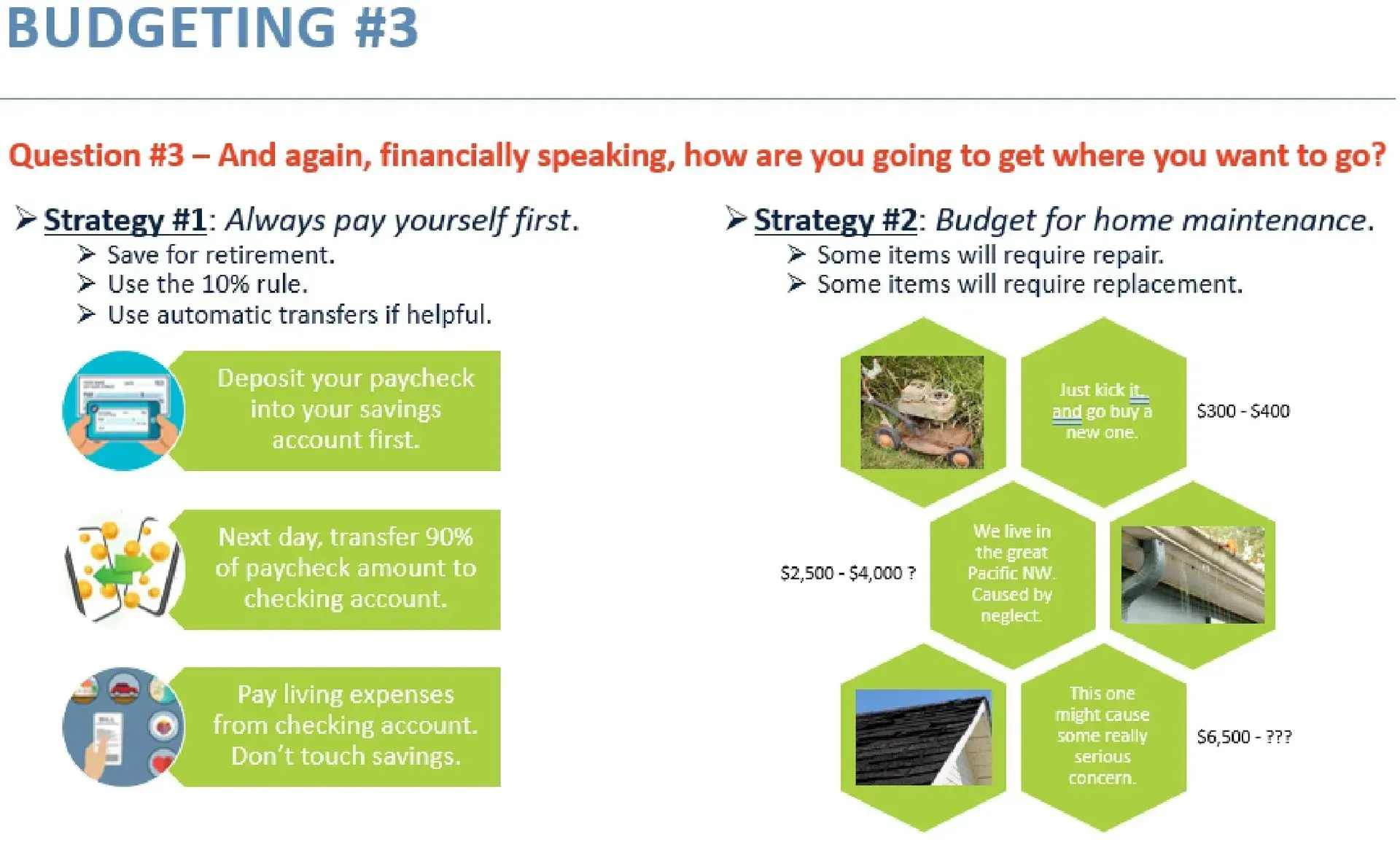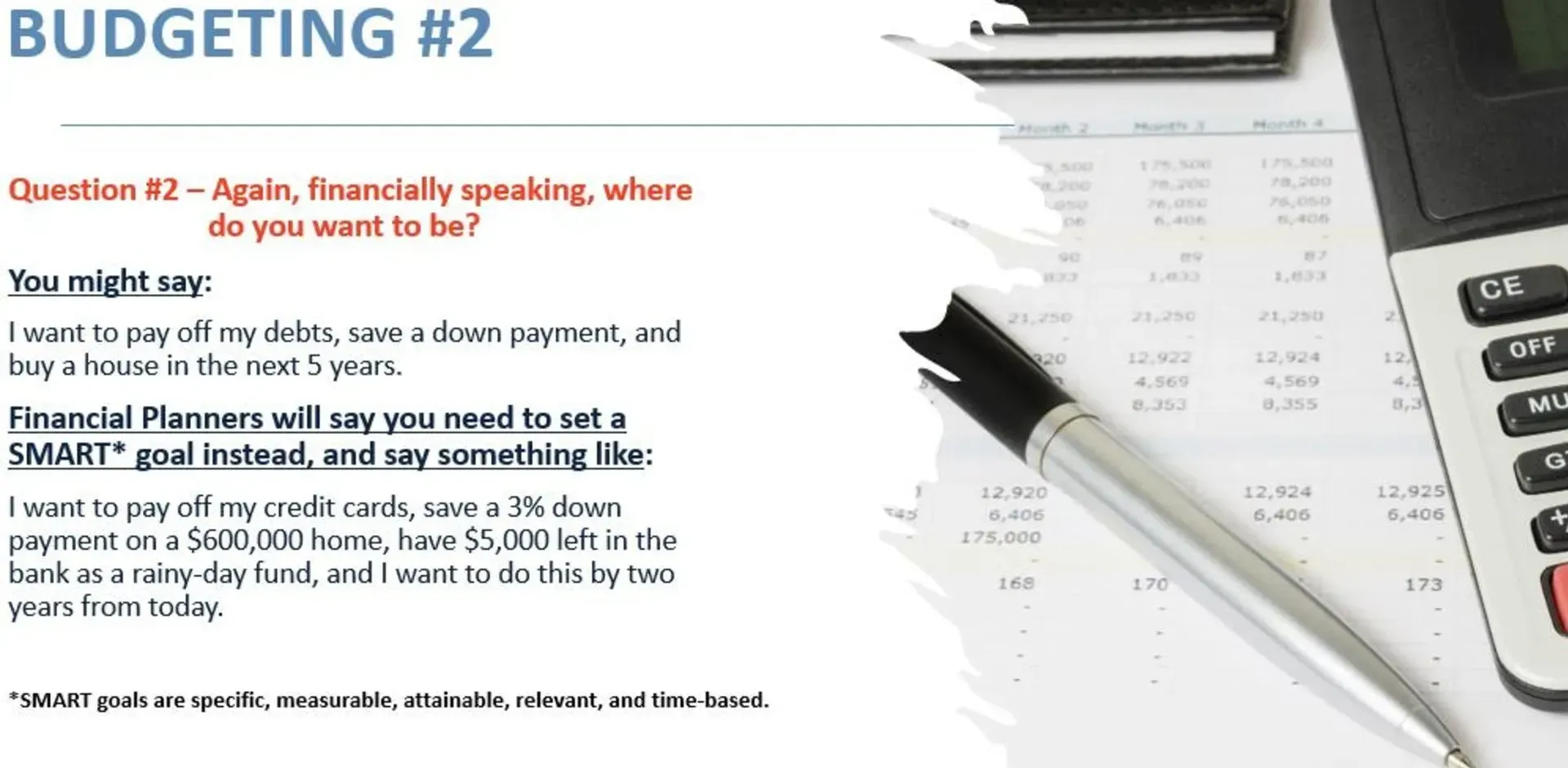Budgeting #3 - More Questions Financial Planners Will Ask You as You Prepare to Purchase a Home

Now that you know where you are financially, as well as where you want to be financially, the next question becomes "How are you going to get there? In the last couple of blog posts, we’ve been dealing with the questions Financial Planners ask prospective clients, which just happen to be exactly the same questions that a good real estate broker and a good mortgage broker should be asking.
The first question, “Where are you, financially speaking?” is simple enough. After all, everyone has to start somewhere. And it really doesn’t matter where you are when you start, it just matters that you start!
The second question, “Financially speaking, where do you want to be?” is the logical follow-up, but sometimes it’s a little difficult to be specific with your answer. And I would add that I don’t believe “specific” is enough…I think you should get down to the bottom of the barrel, the ticky-tacky, nitty-gritty, hard core truth of the matter, and get face-to-face with where you really want to go. Be VERY specific with your answer, using the acronym S.M.A.R.T. Because if you really want to accomplish your financial goals, they should be specific, measurable, attainable, relevant, and time-based.
Once you’ve answered the second question, it’s time to get on to the third question, which is “How are you going to get there?” You have to create your road map, right? Unfortunately, it’s not as simple as asking Siri or Alexa how to go from point A to point B, but once you have that S.M.A.R.T. goal firmly in your head and written down on paper, the job of figuring out how to accomplish it becomes much easier. It usually involves some behavioral changes for most people. This can be problematic for many, but Financial Planners and Mortgage Brokers have developed some simple strategies to help you do just that. Let’s deal with the first two strategies today.
Strategy #1 is really simple - Always pay YOURSELF first. OK, you earn a certain amount on your job, and your employer takes out various taxes, social security, etc., before they give you your actual paycheck. You may have rent, utilities, credit card payments, car payments, etc. that you need to pay each month. But unless you set aside a little for your retirement every time you get paid, your retirement years may be pretty bleak. Financial Planners suggest that you should set aside 10% of your income toward retirement, but it might be hard for you to discipline yourself to do that. So just have your paycheck auto-deposited in your savings account. And when that money shows up in your savings account, transfer 90% of it into your checking account. Live off of what's in checking, and DON'T TOUCH YOUR SAVINGS ACCOUNT! If you set this up so that it's done automatically by your employer and your bank, it's a lot easier to accomplish.
Strategy #2 is to put a line item in your budget for home maintenance, and save a little money each month toward that. You may not own a home yet, but that doesn't matter. Get started doing it now, and you'll already have a little nest egg built up when you do purchase that first home. Look, I live in the Pacific Northwest portion of the U.S., and we get a lot of rain up here. And no matter whether I'm driving through a neighborhood that's priced for first time homeowners, or a neighborhood where the average price exceeds $3,000,000, I see the same three things all the time. I see old, rusted out lawn mowers sitting beside the garage, rain gutters and downspouts that are overflowing and rusty, and roofs with curled up edges on the shingles.
Now you might not be concerned about replacing a lawn mower. They're maybe... What - $300-$500 at the store? That might not pose a problem for you. But what about replacing damaged gutters and downspouts, that start out at around $3,000-$4,000 for a typical home in my neck of the woods? And if you need to have an old roof removed and a new one installed, it can run anywhere from about $8,000-$80,000! Maybe even more, depending on the size of your home, and the complexity of your roof design. Are you ready for that?
Please understand, I'm not saying these things will happen to you. But - they might. And if they do, I want you to be ready for them. I want you to be able to say "I've got this", and be able to sleep at night. If you have any questions about any of this, please feel to reach out to me whenever is convenient for you, via phone, text, or email. Remember, I don't work 9-5, I work start-to-finish. Come back again next week, and we'll deal with Strategies #3 and #4.

Home Mortgage Loan Reviews
Cierra & Jonathan
Jim was absolutely instrumental in our first ever home purchase! He welcomed all of our questions with such warmth and his expertise and respect for our budget made it possible for us to buy the house of our dreams in a market that sometimes felt impossible. We are so grateful to have worked with Him.
Mikahla M.
Jim was amazing and took fantastic care of our mutual clients! He is very communicative and detail oriented, highly recommend!
Tracy H.
I’m always impressed with Jim’s knowledge. If you have questions about home loans and what’s best for you, give Jim a call!
Autumn E.
What more can I say other than how much money he saved me! I went from a mortgage that was drowning me to $800 less per month… That’s beyond HUGE. His whole rate and more secure fabulous rate and more fabulous mortgage payment!
Andrea S.
Jim was very informative in providing details, helping us to select the best loan, and guiding us to the best rate. He walked us through the process of filling out the loan paperwork and was in constant communication throughout the process.
Emma B.
Jim, from start to finish, has been our golden ticket during the process of buying our first home. We met Jim through the homebuyers education class he hosts and we knew right away he was a perfect fit for us. He’s honest, easy to get hold of and efficient. We can’t thank you enough, Jim - you’re the best of the best!
Rachel C.
Jim was very pleasant to work with he understood and worked with all our needs, and made us feel comfortable and confident in our choices. It was a great experience with great communication with everyone involved. We are happy with what Jim provided for us.
Debrah J.
Jim was great to work with. The process was speedy and seamless. We were well informed all along the way.
Mary D.
We have worked with Jim for many years when we purchased our homes or refinanced. He is very knowledgeable about the financial market and transparent. We appreciate that he has our best interest at heart, even if it may not benefit him. Jim is very responsive and we are extremely pleased to have worked with him again on our home loan needs. We absolutely will refer our friends and family to him!
Gerald C.
The outstanding service from Jim and his team was exceptional. The process was painless. And any issues that arose were dealt with quickly and professionally. I will highly recommend.
Tess L.
As first-time homebuyers, we were very nervous about all the complex pieces of this process. Jim was very patient with us and explained everything in detail and answered all our nervous questions with patience and understanding! Could not recommend more!
Jose A.
Jim has been fantastic with us! He has been prompt, honest, professional & a pleasure. I would recommend. 10/10! We look forward to working with Jim for the rest of our lives.
Samantha W.
Jim was amazing, the whole team took care of us and was always there. Thank you!
Adam M.
We had a great experience with Jim. We started in a home buyers class in June, 2016, and he coached us several times even before we were actually ready to buy. He told us exactly what to do, and when and how to do it. He was always available to meet when we needed him, including after regular business hours.
Brian F.
Jim was so responsive and extremely patient with all our questions. And the best part was that there weren't any negative surprises! We will certainly refer others to Jim.
Britt J.
From start to finish Jim has helped us every step of the way. We had many, many questions that he was more than happy to walk us through. We highly recommend using Jim Eyre and his team.
Matthew W.
Jim has been incredibly helpful and a pleasure to work with through the entire process, not only with paperwork, but also personally. Thank you so very much!
Browse My Website
Contact Information
Phone: (425) 210-2963
Email: jeyre@nexamortgage.com
Operating From 13320 Hwy 99, Unit 197, Everett, WA 98204
License: NMLS #442452
Corporate NMLS # 1660690
All Rights Reserved | Jim Eyre




